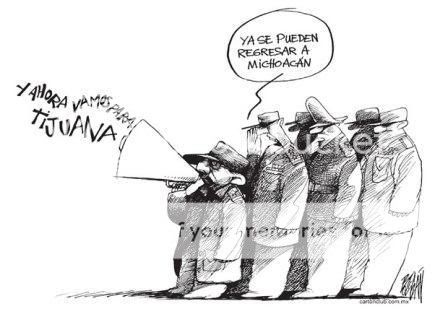
"Nosotros no somos resistencia. A lo que aspiramos es a convertirnos en aliados de la justicia." Zero. Code Geass, capitulo 8.
Un grupo de terroristas luchan en contra del imperio que ha invadido su pais, con el objetivo central de recobrar sus derechos civiles y politicos. A ellos, se les une Zero, un joven que quiere derrocar al sistema imperial y crear un nuevo mundo en el que se pueda vivir en paz. Gracias a el, y a sus habilidades como lider, se formara un nuevo grupo armado que tratara de derrotar al Imperio.
¿Donde ubicarian la trama? ¿En Iraq, en Libano, o en Palestina?
Sunrise, en asociacion con CLAMP, la ubica en Japon del 2010, en una linea de tiempo alternativa, en donde Inglaterra controla politica y militarmente la mayor parte del mundo, incluyendo a los Estados Unidos.
 La invasion de Britannia a Japon.
La invasion de Britannia a Japon.
La trama, a cargo de
Goro Taniguchi e
Ichiro Okouchi, es un reflejo del mundo en que vivimos.
El Imperio Britanico ha conquistado Japon, eliminando cualquier tipo de derechos civiles y politicos, y le ha concedido el nuevo nombre de "Area 11". De esta manera, Britania ha asumido el control politico y militar del pais, con lo cual, Japon ha dejado de existir y los japoneses tambien. Ahora, los pobladores del "Area 11" son llamados "11" (
eleven) y han sido marginados en
ghettos en los que viven practicamente como ratas.

Por el contrario, la familia real britanica se ha extendido, y sus miembros gozan de lujos y comodidades. Los miembros de la realeza consideran al "Area 11" como un destino turistico, y pese al terrorismo esporadico, han instalado incluso una serie de escuelas (privadas) en las que imparten clases a los jovenes britanicos. Los "11" (
eleven) no tienen derecho a la educacion, con excepcion de la formacion militar.
¿Les suena esto conocido?

En medio es este clima politico y militar, dos amigos de la infancia se convertiran en rivales:
Lelouch Lamperouge, quien en realidad encarna a Zero, y
Suzaku Kururugi, un soldado de origen japones que trabaja para las fuerzas militares britanicas.
Ambos personajes daran continuidad a la historia, que hasta el momento se compone de 17 capitulos, y representaran con fidelidad los dos lados de la especie humana: el hombre que lucha en contra del sistema, y el hombre que trata de cambiar el sistema desde adentro.
Rivales en el plano politico, cada uno de ellos encarna en su historia de vida, las contradicciones de la especie humana, que en la serie de anime se representan de una manera coherente, como desde hace mucho no veia.
 El escudo de Britannia.
El escudo de Britannia.
La serie es polemica. Y faltara ver cual es el final que deciden darles los directores de la serie a los personajes. Sin embargo, desde ahora ya se vislumbra que sera un exito comercial en el extranjero, debido a la tematica que maneja y a la necesidad de encontrar productos culturales que hablen sobre los tiempos en que vivimos.
 Un tipo traumado por Japon
Un tipo traumado por Japon escribio en su blog acerca de la serie:
While I watched this, I was wondering if Sunrise for some reason receives an order from the Japanese government to create a nationalistic series. To tell you the truth, I am kind of disturbed to see such display of overt patriotism. This is probably why I don't watch too many political-based series because I will then have to end up talking about politics as well and I hate doing this. [...]
I'm not saying that Code Geass is the government's propaganda tool but from what I know about the current political climate in Japan, it's hard not to worry a bit about it. [...] There are things that I like about Japan and things that I don't like about it. The same thing can be said about almost every series that I watch. [...]
When I said that I find over patriotism to be disturbing, that's applicable to all nations. Also, note the emphasis on overt as opposed to the feel of patriotism on its own. That's what seperates those who work hard to achieve solution without resorting to war and the extremist who won't hesitate to use any means to achieve their goal.
A este comentario, se le unieron criticas de varios lectores, no solo anglosajones, sino japoneses tambien, demostrando que en estos dias, gracias a los alcances tecnologicos, el mundo esta interconectado y que opiniones fascistoides sobre Japon y sobre la animacion que este pais produce pueden ser rastreadas en tiempo real, y contravenidas por los propios connacionales.
Saludos.
